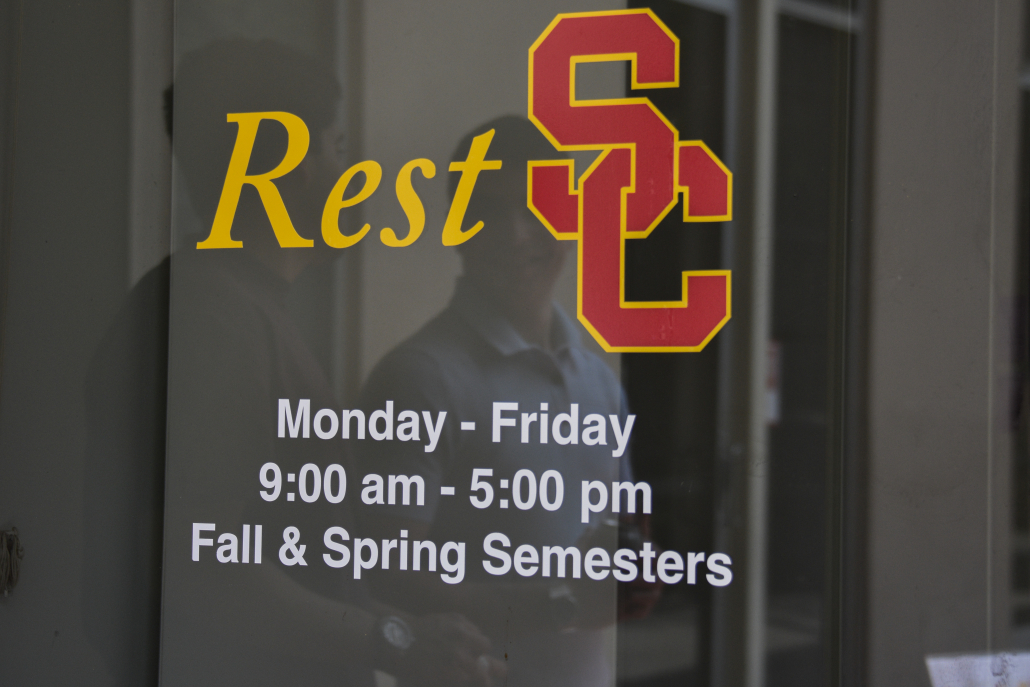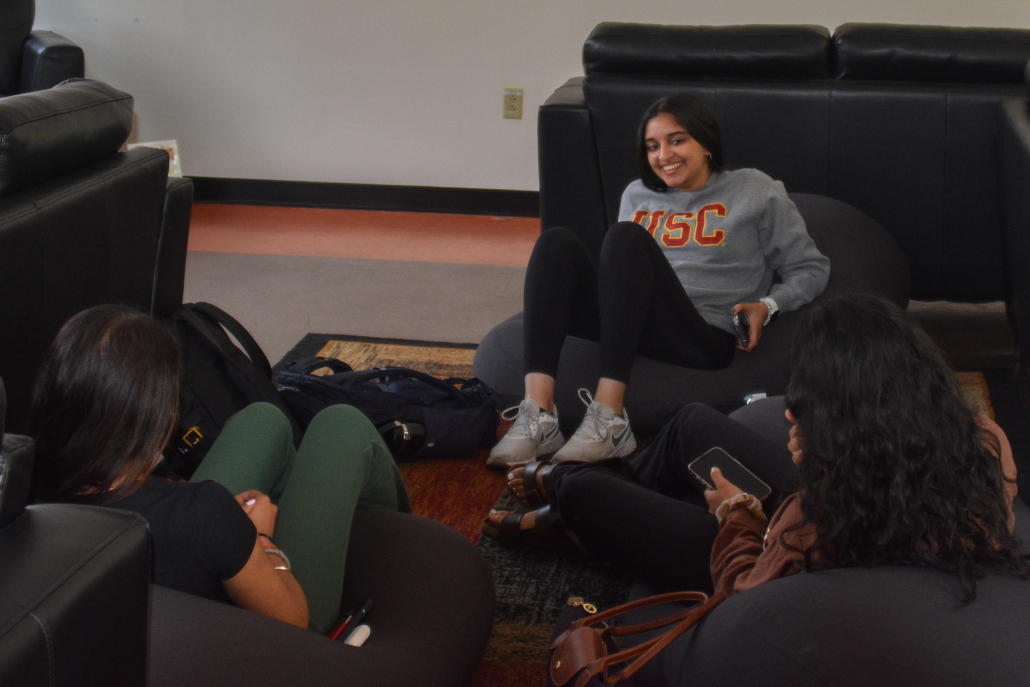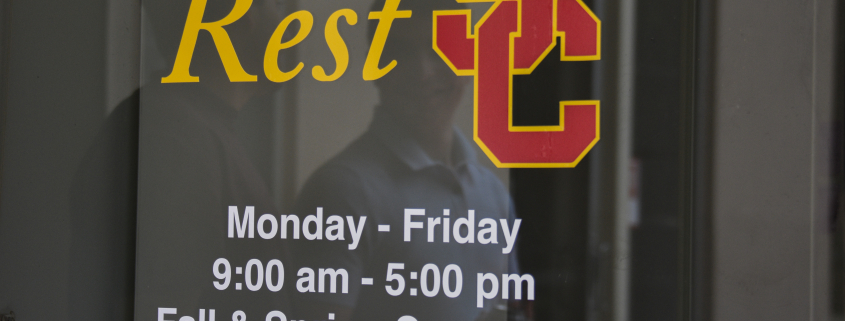USG soft launches wellness and commuter hub

RestSC, USC’s first wellness and commuter hub, soft launched Tuesday afternoon at the University Religious Center. The dark, quiet room overlooks the central courtyard and is filled with several leather couches and Moon Pods, described as the “anti-anxiety float chair.” The space is intended for students to have a place to rest and relax during the school day, whether it’s between classes or waiting out evening traffic.
Undergraduate Student Government senators Sanjana Sambhwani and Sam Habibi led the project, alongside deputy aide to the chief of staff and MENASA advocacy liaison Eduard Ghazaryan. The trio worked with USG and URC leadership over the past year to bring the project to life.
Ghazaryan originally worked on finding a place for commuter students while in USG last year, but the project stalled. This year, working in a new role in USG, he talked with commuter students to work with them on their needs in a commuter hub.
“Commuters have been wildly underrepresented at USC,” Ghazaryan said. “So I wanted to change that.”
Sambhwani, a senator on the wellness committee, campaigned last year on bringing a wellness and commuter hub to USC, wanting to provide a mental health center and giving more resources for students. Habibi, a senator on the academic affairs committee, brought an academic perspective to the project, viewing RestSC as a way to help stressed students.
“It was perfect because it kind of fused … a wellness standpoint [and] this commuter perspective,” Sambhwani said. “And then Sam had this idea of alleviating academic pressure. So it fused together really nicely.”
After talking with key stakeholders, the trio surveyed students at the end of Fall 2022 about the potential project, which received an “overwhelmingly” positive response. They also visited UCLA to see their BruinHub, a space dedicated to commuting and housing-insecure students complete with nap pods and study spaces. BruinHub, located in the John Wooden Center, the gymnasium at UCLA, prompted Sambhwani, Habibi and Ghazaryan to reach out to the Lyon Recreation Center to look for a space there, but the space the gym offered posed noise concerns for RestSC.
After Lyon Center, the three reached out to Leavey Library and the Library for International & Public Affairs, but the project eventually found its home at the University Religious Center.
“We were just hitting a lot of roadblocks in terms of administrative, maintenance and funding barriers,” Sambhwani said. “And then, when we connected with URC, who was already interested in a project like this, everything just clicked into place. They were incredibly welcoming.”
USG’s main point of contact at the URC was Vanessa Gomez Brake, associate dean of religious and spiritual life. Gomez Brake said RestSC’s journey to the URC emerged from a longstanding relationship between the URC and undergraduate and graduate student governments, as well as a common interest in developing a space for students to rest and find a home.
“[There are] a variety of needs that students have on campus that are not being met whether it’s commuters or just having a place to relax outside of a library,” Gomez Brake said. “USG talked us through their vision and from there we said, ‘All right, let’s try it.’”

Though RestSC is open to all students and not strictly labeled as a commuter hub, it was built with commuter students especially in mind. Around 10% of USC students commute, one of whom is David Aynaszyan. Commuting daily from Glendale, Anyaszyan said his commute can last 45 minutes in traffic each way. He often finds himself leaving early and staying late on campus to avoid traffic.
“I’m basically here from 8:00 a.m. to 9:00 p.m.,” Anyaszyan said. “I gotta leave at 6:00 a.m. to beat the morning traffic, so trying to find time to sleep gets really tough. That’s why a place like this is very useful; even a thirty minute nap can go a long way.”
Varun Soni, the Dean of Religious and Spiritual Life at USC, said the goals of RestSC align well with the mission of the University Religious Center he oversees.
“One of the goals of any university religious center is to be a home away from home for all students,” Soni said. “We will do anything that brings people together at a time where we feel like a lot of students are really silently struggling with loneliness.”
Soni said loneliness is especially a concern for commuter students, for whom RestSC is particularly aimed. He also emphasized the space is intended for all students, even though its placement in the university’s religious center is not merely coincidental.
“Every one of our religious and spiritual traditions have some component of rejuvenation or rest built into them, whether it’s the Sabbath, prayer, meditation or other kinds of worship spaces that essentially allow you to calm your mind,” Soni said. “But RestSC connects the dots across all of our religious traditions. I want it to be thought of as a spiritual space … maybe you could call that secular but I think that resting is a spiritual practice.”
Soni said he wants RestSC to be seen as a place to individually rest, as the name suggests, but sees the act of rest as something bigger than simply taking a nap.
“I’m concerned about all students when it comes to rest,” Soni said. “Our hope is that by having a space that calls on people to rest, we will legitimize rest. And in the age of anxiety and outrage, resting is almost a subversive act of resistance.”
Brandon Harris, associate dean of religious and spiritual life, noted the importance of rest in religious traditions, in history and in resistance.
“In Jewish and Christian traditions, there’s a huge emphasis on the Sabbath; that day is holy, because humanity is holy,” Harris said. “So this idea of ‘rest is resistance’ comes from Tricia Hersey-Patrick . . . who wrote that society, particularly for people of color, has for centuries attached value to production, through slavery and economic systems. She says [rest] is not just about napping; it’s a resistance.”

